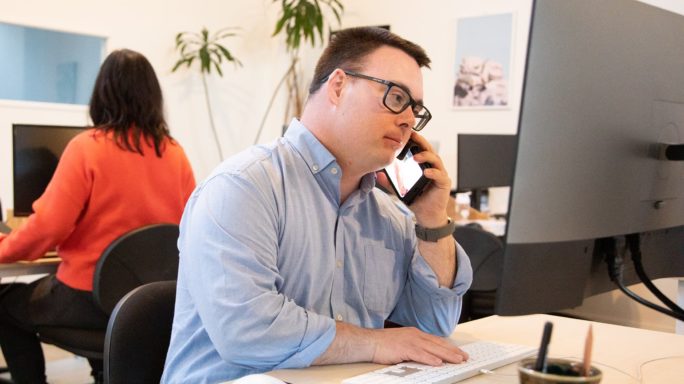Technology & Innovation
Corporate to SaaS: How can future startup founders make the jump?
What's it like moving from working as a high-level executive at a corporate to founding a SaaS startup? Two founders share their stories.

Regular salary, pensions and great benefits.
Why would dynamic business leaders leave the comfy surroundings of a big corporate company for the fast and furious challenge of working at a Software as a Service (SaaS) startup?
What does it take for high-level executives to swap the corporate life with founding or joining a seed stage or early stage business.
And if you do make the jump, what do you need to know?
In this article, we feature insights from people who’ve been there and done it.
Here’s what we cover:
- Your startup idea could be a solution to a big problem
- If the technology isn’t out there, maybe you should build it
- In business, spreadsheets have limitations
- With SaaS, you can start on a clean slate
- As you grow, you may need to hire a CFO
- In a SaaS startup, don’t work harder, work smarter
Your startup idea could be a solution to a big problem
Valutico was set up in 2014 and is a business that deals with valuations. That’s an important process in mergers and acquisitions where large corporates must work out the value of businesses they want to acquire or merge with.
Valuations can be straightforward if the company in question is listed on the stock market. But for private companies, it can be a complex and ongoing analysis.
Valutico has grown to a point where it now has around 60 staff, headquartered in Vienna and with subsidiaries in the UK and US.
It has a product now in use in 26 countries, represented by team members and partners on five continents.
Paul Resch is the founder and CEO of Valutico.
Before that, he was an investment banker in mergers and acquisitions at Deutsche Bank, and he has an academic background in quantitative finance and economics.
The spark that started his journey from corporate investment banker to the founder of a successful SaaS startup was his realisation that valuations in big businesses were inefficiently done.
Paul says: “People usually do valuation analysis in spreadsheets.
“They’ll digest all the information about a business and translate it, creating a forecast of its financial performance, incorporating everything about the company and its environment, such as its strategy and competitors.
“You run it through different valuation models and try to come up with a coherent story. There’s a bit of storytelling, with narrative and the numbers pulled together.”
“I did a lot of valuation work as an investment banker. It was one of those things which I thought was inefficient. It works, but I thought there was a better way to do it.”
If the technology isn’t out there, maybe you should build it
WCKDR RZR is a financial startup earlier on its journey, developing technology that looks to automate global data governance compliance using machine learning. In 2022, WCKDR RZR secured $1.2m (£1m) of funding from angel investors.
WCKD RZR’s founder is Chuck Teixeira, another person who moved from a big corporate machine to the SaaS startup world. He was previously chief administrative officer at HSBC.
Chuck was looking for tools in the market that could help automate the painstaking process of collecting 10 PB of data from 1.6 million clients across 65 different jurisdictions.
Ultimately, his team pulled together information into an on-premise Hadoop environment.
He says: “Jonathan Farina [chief technology officer at WCKDR RZR] and I are known for building the world’s largest wholesale banking and big data environment—part of a migration to Google Cloud.”
The search for a solution was where the idea for WCKD RZR came from.
Chuck says: “John and I were frustrated with the time we took trying all the tools in the market and spending incredible amounts of money trying to build a big data environment.”
Chuck’s problem was that with big monolithic data storage solutions, you could never get all the data you want in there. And even if you can, you can’t use it because the data isn’t labelled or subject to myriad rules.
Chuck says of WCKD RZR: “We took a step back, almost starting from a white piece of paper.
“First, we said that all people want is to use their data and not spend huge amounts of money transforming their systems.
“And secondly, we fundamentally didn’t believe that people should pay money to use their data.
“So, we created software that allows you to connect to data wherever it is and whatever type of database you’re using.”
This led to WCKD RZR creating its first product, Data Watchdog.
It’s data enablement software that sits between an organisation’s databases and catalogues the data in them through machine learning.
It allows users to find, govern and access data while remaining compliant over different jurisdictions.
In business, spreadsheets have limitations
Paul Resch of Valutico says he loves Excel and financial modelling but realises that with spreadsheets, you very quickly run into limitations.
They can be tedious and slow, and you have issues with fragmented data sources such as PDFs, CSV files and information from SQL databases.
He adds: “Of course, spreadsheets are very prone to human errors.
“There are many stories of financial models where people introduce mistakes on huge transactions, which means you could do mergers and acquisitions based on false assumptions because of these mistakes.”
There’s where Valutico comes in, a tech-enabled platform that looks to automate and simplify valuation processes to enhance the analysis and operations of its corporate clients.
It already has a range of clients, from tax auditing accounting advisory services to financial investors.
Spreadsheets aren’t going anywhere, but it’s worth searching out better ways to do things for many business applications.
Paul says: “My favourite example is with CRM [customer relationship management] tools around 25 years ago. People used spreadsheets to keep track of their client data.
“Then Salesforce came along and showed that CRM isn’t just about storing data on clients but managing the workflows of sales processes right.
“With Valutico, we wanted to do something similar—to build a standardised tool that connects to all the databases and financial models you have.”
With SaaS, you can start on a clean slate
A big business may have a sophisticated and complex technology stack. It might even have legacy technology that existed for a long time and will have gates, standards and requirements with multiple sign-offs needed to get anything done.
Jonathan Farina, CTO of WCKD RZR, says that control is there for a reason, and it’s very important, but it doesn’t allow you to innovate very quickly.
Yes, you can innovate, and there might be channels there to do so, but you’ll do it in a very structured way.
“It’s a different world with a startup,” Jonathan explains. “I thought I understood this until I got on the ground, and you find you have absolutely nothing. Remember, you’ve just come from a lovely warm, cosy environment where everything is provided in some manner.
“With a startup, you must build the tools from zero, which seems incredibly daunting. But it’s a huge opportunity because you can learn from your mistakes.
“We like to think that we’ve built cutting-edge technology very quickly because we had the freedom to innovate.
“In any large corporate, you have a very defined role. In a startup, you don’t.
“You know you will write code, work on presentations, pitch to clients, etc. That is a challenge. It’s great fun, and every day is different.”
As you grow, you may need to hire a CFO
Valutico’s Paul Resch says of financing: “We bootstrapped most of the time and managed to grow to a team of 60 people. We got investment from friends and family and research and development grants. Austria’s landscape is very good.
“We signed a term sheet three weeks ago for our first real financing round, and we’re going through due diligence on that.”
Paul has acted as the CFO with a small finance team, but with financing and funding, the growing startup needs to deal with increasing collection and billing complexity.
Valutico’s business is subscription-based, which comes with its unique challenges, although a lot of the financial work is automated.
Paul explains: “For legacy reasons, we built our financials on Google Sheet technologies. We developed sophisticated reporting tools that import data from other sources—one holding company and three international subsidiaries.
“Now we are considering moving to a proper accounting or ERP [enterprise resource planning] solution. We don’t want to wait too long as we have a lot of analysis work as a data-driven company, with a lot of work around cohort and churn analysis.”
Valutico is looking to hire a full-time SaaS CFO. Paul is looking for a professional with experience in building a team, understanding what’s involved in Valutico’s valuation business model and the next growth stage. They must understand SaaS metrics and contribute to the product roadmap and strategy.
Paul says: “Our new CFO should contribute to other areas in the company—specifically product development and training employees on valuation techniques.
“We’re also building a professional services team here in-house, so I would also expect our CFO to contribute to that.
“They can help with marketing. For example, we need people who can write valuation-specific white papers, and I think our CFO should contribute.”
In a SaaS startup, don’t work harder, work smarter
Although startup founders can often talk of burning the midnight oil, Paul Resch says he worked a lot more when he was an investment banker.
He says: “I worked a lot more when I was in banking. I still work a lot, but now I think I work smarter. I don’t do shifts until 4am anymore.
“We do have crunch times. Now and then, with important projects, all hands are on deck. But I don’t expect people to be in the office at midnight every day to show their faces. I think that’s silly. I think that’s something that the investment banking world has too much of.
“I think that needs a cultural change. Work smarter and more efficiently.
“It doesn’t always feel like work if it’s fun and we have a great team. I think we have a great company culture, and so at least to me, it doesn’t feel like work.”







Ask the author a question or share your advice